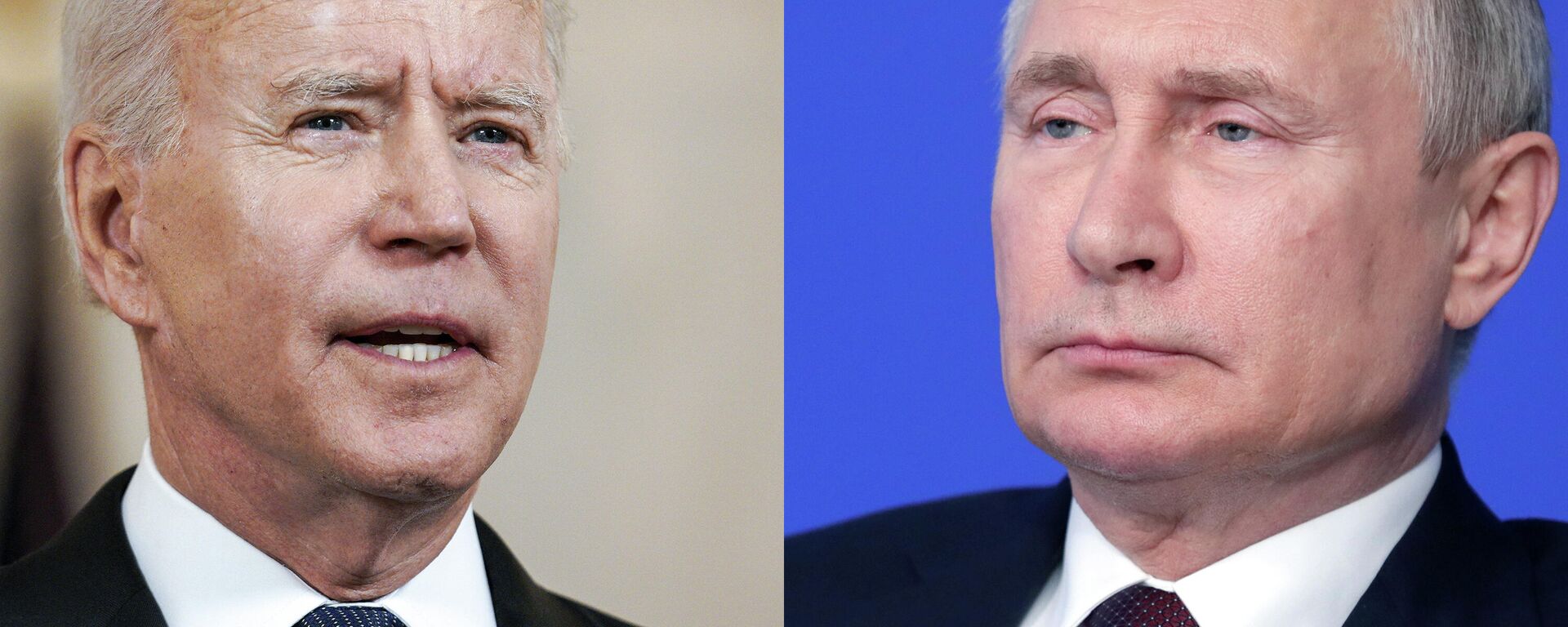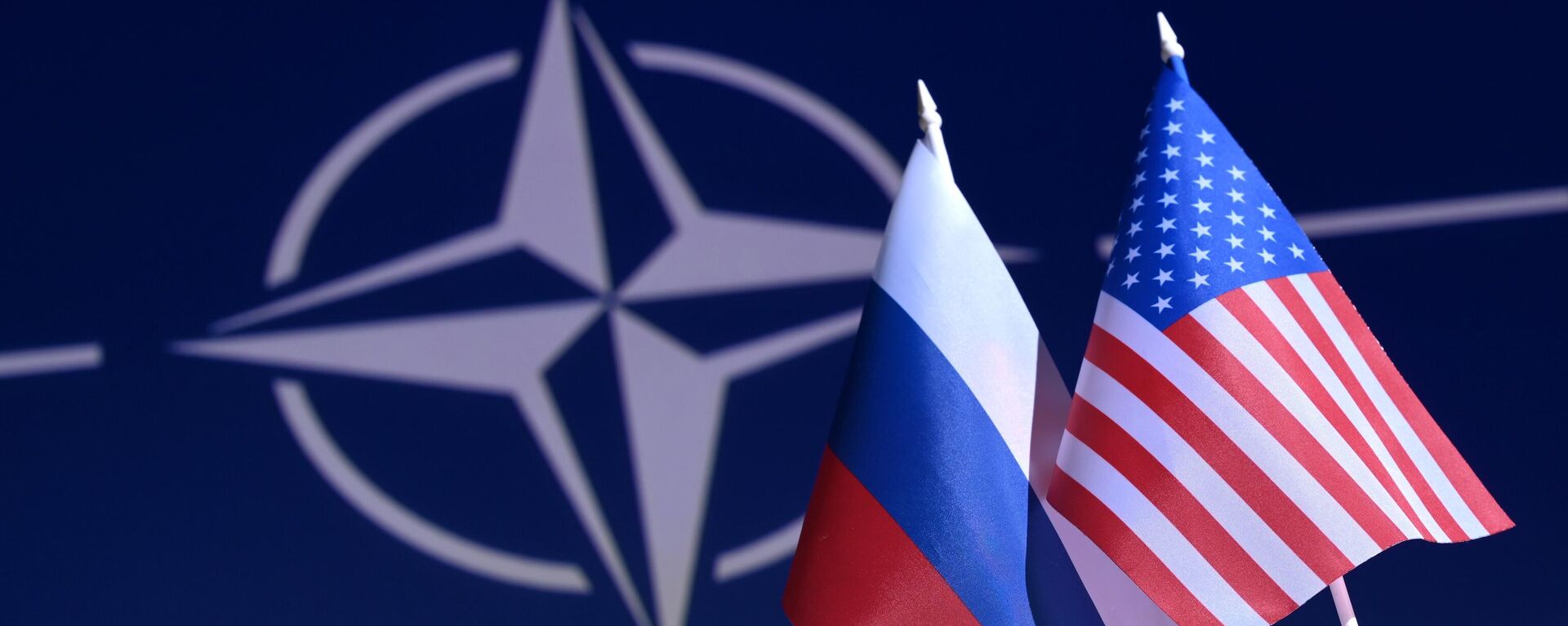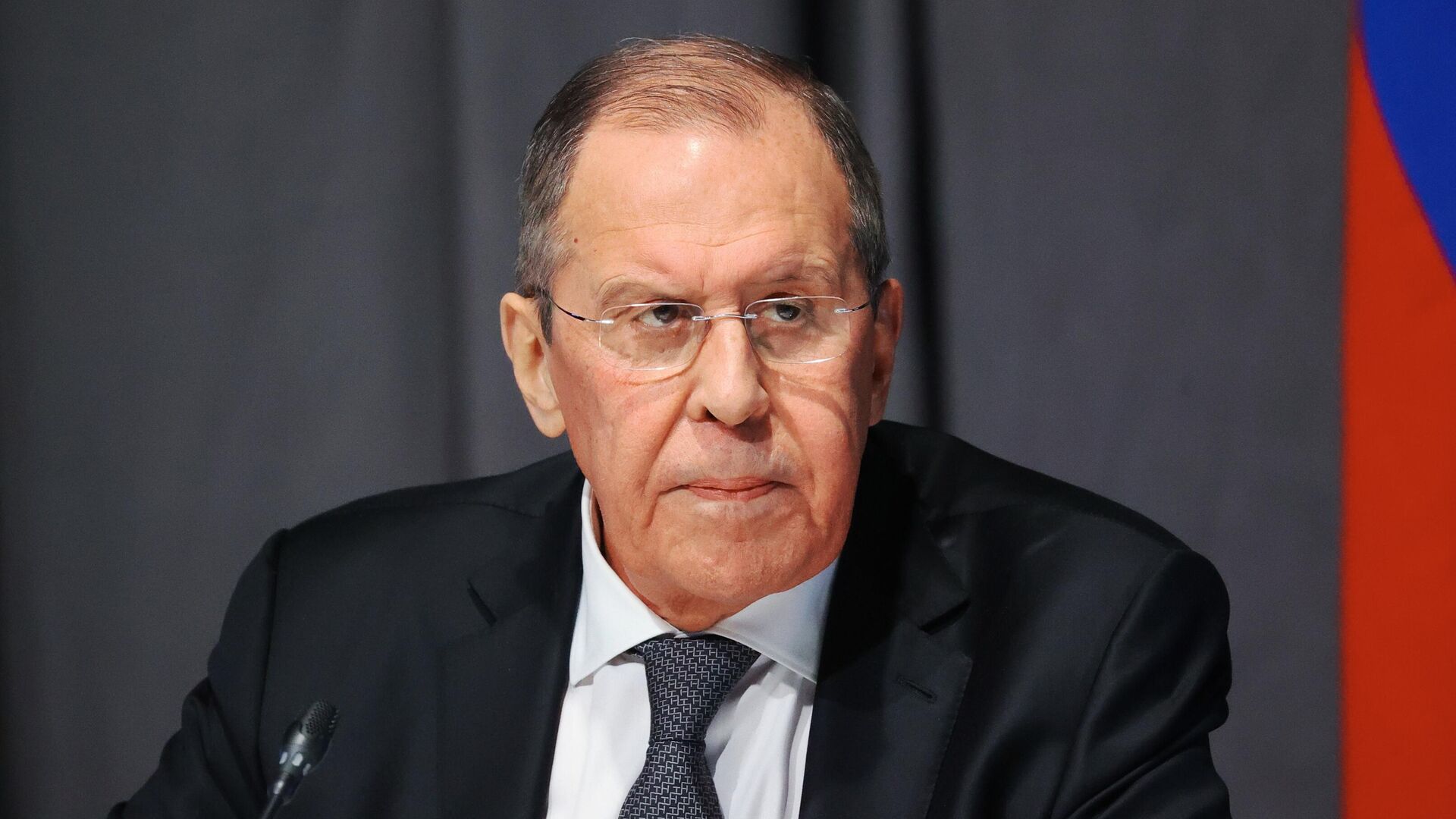https://sputnikglobe.com/20211231/lavrov-to-sputnik-russia-suggests-creating-legalising-new-system-of-security-agreements-1091936821.html
Lavrov to Sputnik: Russia Will Take Measures to Eliminate Threats If US Ignores Security Proposals
Lavrov to Sputnik: Russia Will Take Measures to Eliminate Threats If US Ignores Security Proposals
Sputnik International
Russia's proposals on security guarantees are aimed at creating and legalising a new system of agreements in the field of security, Foreign Minister Sergei Lavrov told Sputnik.
2021-12-31T07:52+0000
2021-12-31T07:52+0000
2022-08-06T13:27+0000
world
joe biden
russia
ukraine
vladimir putin
security
nato
us
https://cdn1.img.sputnikglobe.com/img/07e5/0c/16/1091715577_0:0:3225:1815_1920x0_80_0_0_635d7f4085760547daac44b7601401b1.jpg
Moscow will take measures to ensure strategic balance and eliminate threats if the United States and NATO do not respond to the proposals on security guarantees in an adequate time frame, Russia's top diplomat has stressed.The foreign minister mentioned that Moscow's proposals on security guarantees envision the non-expansion of NATO to the east and deployment of strike weapons near Russia's borders, but they all contain other elements that in the end should "form those very reliable, legally binding security guarantees"."Participation of high-ranking military personnel of the United States and the countries of the [NATO] alliance is fundamentally important for us", Lavrov said, adding that Russia will not allow the US and NATO to delay the process with "endless discussions".The foreign minister's comments follow a phone conversation between Russian President Vladimir Putin and his US counterpart, Joe Biden, where the two focused on the security guarantee talks set for early January 2022 amid simmering tensions over Ukraine.The security guarantees talks will be held in three formats: between Russia and the US in Geneva on 10 January, followed by a Russia-NATO Council meeting on 12 January, and Russia-OSCE consultations on 13 January.During Thursday's phone call, the US president emphasised the special responsibility that Russia and the United States share for ensuring stability in the world, and informed President Putin that Washington will hold consultations with its allies on the security guarantee talks. Moscow, meanwhile, once again pointed out that Russia needs legally binding agreements on the security guarantees. Kremlin aide Yuri Ushakov stressed that it is important that the upcoming bilateral talks on the matter do not turn into meaningless chatter. The call, the second this month, was arranged at President Putin's request. The Russian head of state has repeatedly stressed that the nation needs firm guarantees from the United States and NATO that the alliance will not expand to the east, and Ukraine will not become a member of the bloc, which he described as a "red line" for Moscow."Our actions will depend on the unconditional guarantees of Russian national security, rather on the course of negotiations [on the security guarantees]. We made it clear that NATO's expansion to the east is unacceptable. The US is on our doorstep with its missiles. How would Americans react if we were to deploy our missiles on the US border with Canada or Mexico?", he wondered during his annual press conference last week.The Russian president also pointed out how the United States and its allies have repeatedly cheated Russia by saying they wouldn't extend NATO into Eastern Europe before doing precisely that.Poland, Hungary, and the Czech Republic ascended to NATO in 1999, followed in 2004 by Bulgaria, Romania, Slovakia, Slovenia, and the former Soviet republics of Estonia, Latvia, and Lithuania. Albania and Croatia joined the alliance in 2009, Montenegro was included in 2017, and North Macedonia became the latest addition in 2020. The North Atlantic Treaty Organisation currently consists of 30 member states.What is Russia Proposing?In mid-December, the Russian Foreign Ministry laid out two comprehensive draft agreements on security guarantees between Russia, the United States, and NATO.Under the draft proposals, Russia and NATO will "exercise restraint in military planning and conducting exercises to reduce the risks of eventual dangerous situations in accordance with their obligations under international law, including those set out in intergovernmental agreements on the prevention of incidents at sea outside territorial waters and in the airspace above, as well as in intergovernmental agreements on the prevention of dangerous military activities".The proposals also stipulate the creation of "hotlines" for emergency contacts between the parties.In the drafts, Russia also suggests that the US commit to not setting up military bases in ex-Soviet republics that are not NATO members and refrain from further expansion of the alliance to the east.
https://sputnikglobe.com/20211230/putin-biden-call-came-to-end-kremlin-spokesman-confirms-1091924744.html
https://sputnikglobe.com/20211217/russian-foreign-ministry-publishes-draft-agreements-on-russia-us-nato-security-guarantees-1091600278.html
ukraine
Sputnik International
feedback@sputniknews.com
+74956456601
MIA „Rossiya Segodnya“
2021
Sputnik International
feedback@sputniknews.com
+74956456601
MIA „Rossiya Segodnya“
News
en_EN
Sputnik International
feedback@sputniknews.com
+74956456601
MIA „Rossiya Segodnya“
Sputnik International
feedback@sputniknews.com
+74956456601
MIA „Rossiya Segodnya“
us, russia, segrei lavrov, russian foreign minister, russia's security guarantee proposals, nato
us, russia, segrei lavrov, russian foreign minister, russia's security guarantee proposals, nato
Lavrov to Sputnik: Russia Will Take Measures to Eliminate Threats If US Ignores Security Proposals
07:52 GMT 31.12.2021 (Updated: 13:27 GMT 06.08.2022) MOSCOW (Sputnik) - Russia's proposals on security guarantees are aimed at creating and legalising a new system of agreements in the field of security, Foreign Minister Sergei Lavrov told Sputnik.
Moscow will take measures to ensure strategic balance and eliminate threats if the United States and NATO do not respond to the proposals on security guarantees in an adequate time frame, Russia's top diplomat has stressed.
"If a constructive response does not follow within a reasonable time and the West continues its aggressive line, then Russia will be forced to take all necessary measures to ensure a strategic balance and eliminate unacceptable threats to our security", Lavrov told Sputnik.
The foreign minister mentioned that Moscow's proposals on security guarantees envision the non-expansion of NATO to the east and deployment of strike weapons near Russia's borders, but they all contain other elements that in the end should "form those very reliable, legally binding security guarantees".
"Our proposals are aimed at creating and legalising a new system of agreements based on the principle of the indivisibility of security and abandonment of attempts to achieve military superiority, which was approved unanimously by the leaders of all Euro-Atlantic states in the 1990s. I would like to emphasise that what we need is legally binding guarantees since our Western colleagues systematically fail to fulfill political obligations, not to mention voiced assurances and promises given to Soviet and Russian leaders", Lavrov said.
"Participation of high-ranking military personnel of the United States and the countries of the [NATO] alliance is fundamentally important for us", Lavrov said, adding that Russia will not allow the US and NATO to delay the process with "endless discussions".
The foreign minister's comments follow a phone conversation between Russian President Vladimir Putin and his US counterpart, Joe Biden, where the two focused on the security guarantee talks set for early January 2022 amid simmering tensions over Ukraine.

30 December 2021, 21:52 GMT
The security guarantees talks will be held in three formats: between Russia and the US in Geneva on 10 January, followed by a Russia-NATO Council meeting on 12 January, and Russia-OSCE consultations on 13 January.
During Thursday's phone call, the US president emphasised the special responsibility that Russia and the United States share for ensuring stability in the world, and informed President Putin that Washington will hold consultations with its allies on the security guarantee talks.
Moscow, meanwhile, once again pointed out that Russia needs legally binding agreements on the security guarantees. Kremlin aide Yuri Ushakov stressed that it is important that the upcoming bilateral talks on the matter do not turn into meaningless chatter.
"Putin outlined in detail the basic principles laid down by Russia in the security proposals and emphasised that we will seeks to ensure Russia's security. In principle, the US president agreed with this point of view", Ushakov said, adding, "Biden clearly stated that the United States does not intend to deploy offensive strike weapons in Ukraine. And Putin noted that this is one of the key points for us".
The call, the second this month, was arranged at President Putin's request. The Russian head of state has repeatedly stressed that the nation needs firm guarantees from the United States and NATO that the alliance will not expand to the east, and Ukraine will not become a member of the bloc, which he described as a "red line" for Moscow.
"Our actions will depend on the unconditional guarantees of Russian national security, rather on the course of negotiations [on the security guarantees]. We made it clear that NATO's expansion to the east is unacceptable. The US is on our doorstep with its missiles. How would Americans react if we were to deploy our missiles on the US border with Canada or Mexico?", he wondered during his annual press conference last week.
The Russian president also pointed out how the United States and its allies have repeatedly cheated Russia by saying they wouldn't extend NATO into Eastern Europe before doing precisely that.
"'Not one inch to the East', they told us in the '90s. So what? They cheated, just brazenly tricked us! Five waves of NATO expansion and now already, please, the missile systems are appearing in Romania and Poland", Putin said.
Poland, Hungary, and the Czech Republic ascended to NATO in 1999, followed in 2004 by Bulgaria, Romania, Slovakia, Slovenia, and the former Soviet republics of Estonia, Latvia, and Lithuania. Albania and Croatia joined the alliance in 2009, Montenegro was included in 2017, and North Macedonia became the latest addition in 2020. The North Atlantic Treaty Organisation currently consists of 30 member states.
What is Russia Proposing?
In mid-December, the Russian Foreign Ministry
laid out two comprehensive draft agreements on security guarantees between Russia, the United States, and NATO.
"The Parties shall settle all international disputes in their mutual relations by peaceful means and refrain from the use or threat of force in any manner inconsistent with the purposes of the United Nations", one of the proposals reads.
Under the draft proposals, Russia and NATO will "exercise restraint in military planning and conducting exercises to reduce the risks of eventual dangerous situations in accordance with their obligations under international law, including those set out in intergovernmental agreements on the prevention of incidents at sea outside territorial waters and in the airspace above, as well as in intergovernmental agreements on the prevention of dangerous military activities".

17 December 2021, 10:44 GMT
The proposals also stipulate the creation of "hotlines" for emergency contacts between the parties.
In the drafts, Russia also suggests that the US commit to not setting up military bases in ex-Soviet republics that are not NATO members and refrain from further expansion of the alliance to the east.
"The Parties shall refrain from deploying their armed forces and armaments, including in the framework of international organisations, military alliances or coalitions, in areas where such deployment could be perceived by the other Party as a threat to national security, with the exception of such deployment within the national territories of the Parties", the document says.




